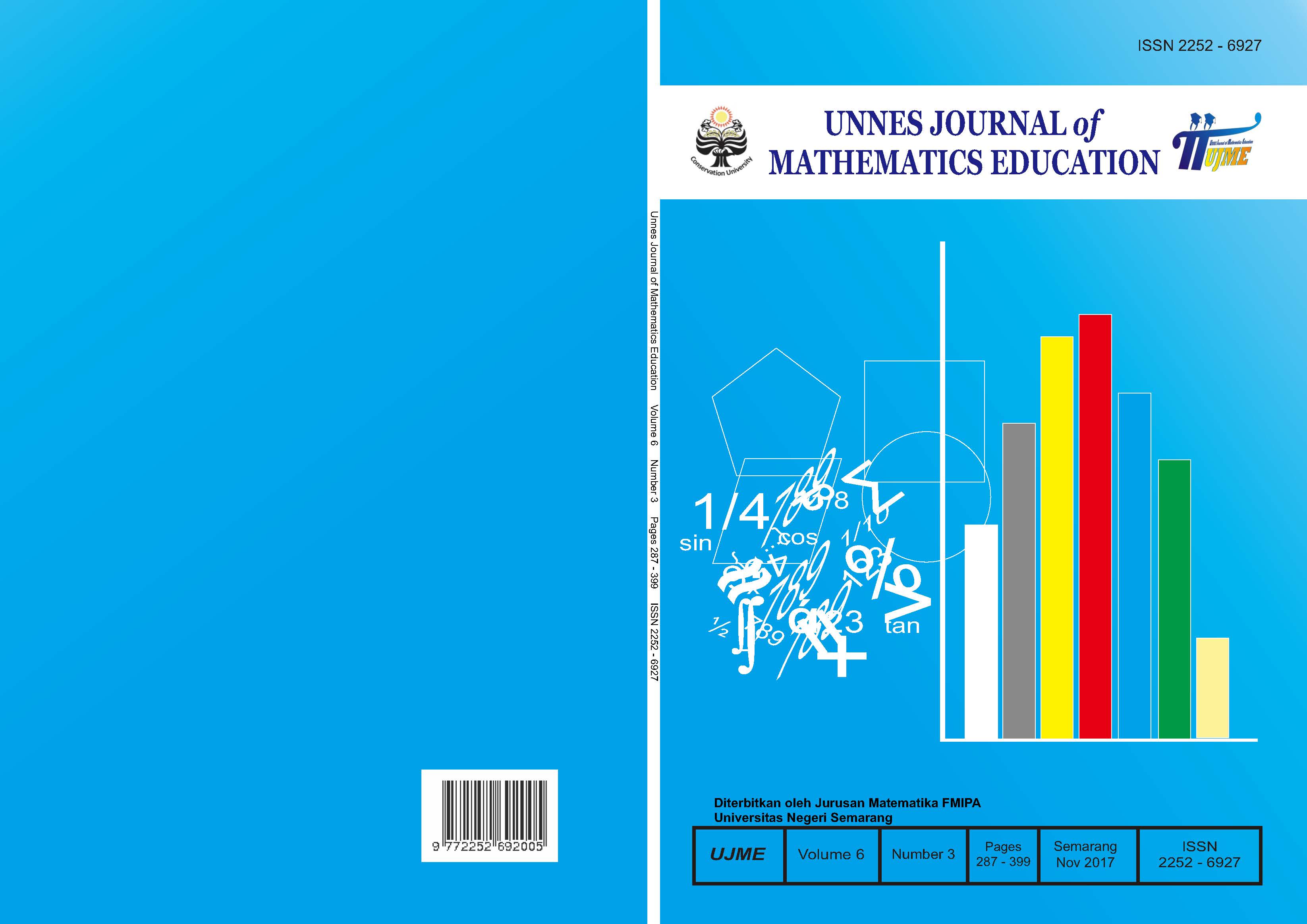Analysis of 7th Grade Students’ Inductive Reasoning Skill in PBL-Bertema Model Towards Responsibility Character
##plugins.themes.academic_pro.article.main##
Abstract
This study aims to (1) to test the PBLBertema effectiveness of students inductive reasoning abilities, (2) to analize students inductive reasoning abilities in terms of student responsibilities. This research is quantitative research followed by interview. The population is the class of VII SMP N 3 Ungaran as many as 343 students with the sample of the class students VII G as the experimental group of 35 students and the class students VII E as the control group of 33 students. The instrument used is a matter of inductive reasoning test, responsibility character questionnaire, student response questionnaire, and teacher activity
observation sheet. The data obtained were analyzed using proportion test, t-test, two propotion test, paired ttest, and normalized gain. The subjects of this reasearch are each of the two students with high responsibility, medium responsibility, and low responsibility. The results of this study indicated that PBLBertema learning is effective to improve students inductive reasoning abilities. Students with high responsibility are able to dominate all inductive reasoning indicators that is data ghatering, finding patterns, and making conclusions; Students with medium responsibility have not able to dominate indicator finding patterns; Students with low responsibility have not able to dominate indicator finding patterns and making conclusions.
##plugins.themes.academic_pro.article.details##
References
Depdiknas. (2006). Peraturan Menteri Pendidikan Nasional Nomor 22 Tahun 2006 Tentang Tentang Standar Isi Pendidikan Dasar dan Menengah, Jakarta: Depdiknas.
Depdikbud. (2016). Peraturan Menteri Pendidikan Dan Kebudayaan Nomor 21 Tahun 2016 Tentang Standar Isi Pendidikan Dasar dan Menengah, Jakarta: Depdikbud.
Gusti, P.S. (2007). Pengembangan Pembelajaran Berpendekatan Tematik Berorientasi Pemecahan Masalah Matematika Terbuka untuk Mengembangkan Kompetensi Berpikir Divergen, Kritis, dan Kreatif. Jurnal Pendidikan dan Kebudayaan. 59, 1004-1024.
Haverty, L.A. (2000). Solving Inductive Reasoning Problems in Mathematics: Not-so-Trivial Pursuit. Cognitive Science, 24 (2), 249-298.
Kemendiknas. (2011). Panduan Pelaksanaan Pendidikan Karakter, Jakarta: Kemendiknas.
Khoiri, W., Rochmad, & Cahyono, A.N. (2013). Problem Based Learning Berbantuan Multimedia Dalam Pembelajaran Matematika Untuk Meningkatkan Kemampuan Berpikir Kreatif. Unnes Journal of Mathematics Education 2(1): 115-121.
Magiera, M. (2012). K-8 Preservice Teachers’ Inductive Reasoning in the Problem-Solving Contexts. Marquette University , 1-26.
Mullis, I. V. S., Michael, O. M., Pierre, F., & Alka, A. (2012). Timss 2011 International Results in Mathematics. Amsterdam,The Netherlands: International Association for the Evaluation of Educational.
OECD. (2013), PISA 2012 Results: What Students Know and Can Do – Student Performance in Mathematics, Reading and Science (Volume I), OECD Publishing.
Rahayu, R. (2016). Peningkatan Karakter Tanggungjawab Siswa SD Melalui Penilaian Produk Pada Pembelajaran Mind Mapping. Jurnal Konseling Gusjigang. 2 (1). 2460-1187.
Suryaningsih, D. (2015). Application Problem Based Learning (PBL) Model to Improve Mathematical Reasoning Ability Students on The Subject Equation of A Straight Line of VIIIth C in Junior High School 13 Jember in Odd Semester 2014/2015 Academic Year. Artikel Ilmiah Mahasiswa , 1-5.
